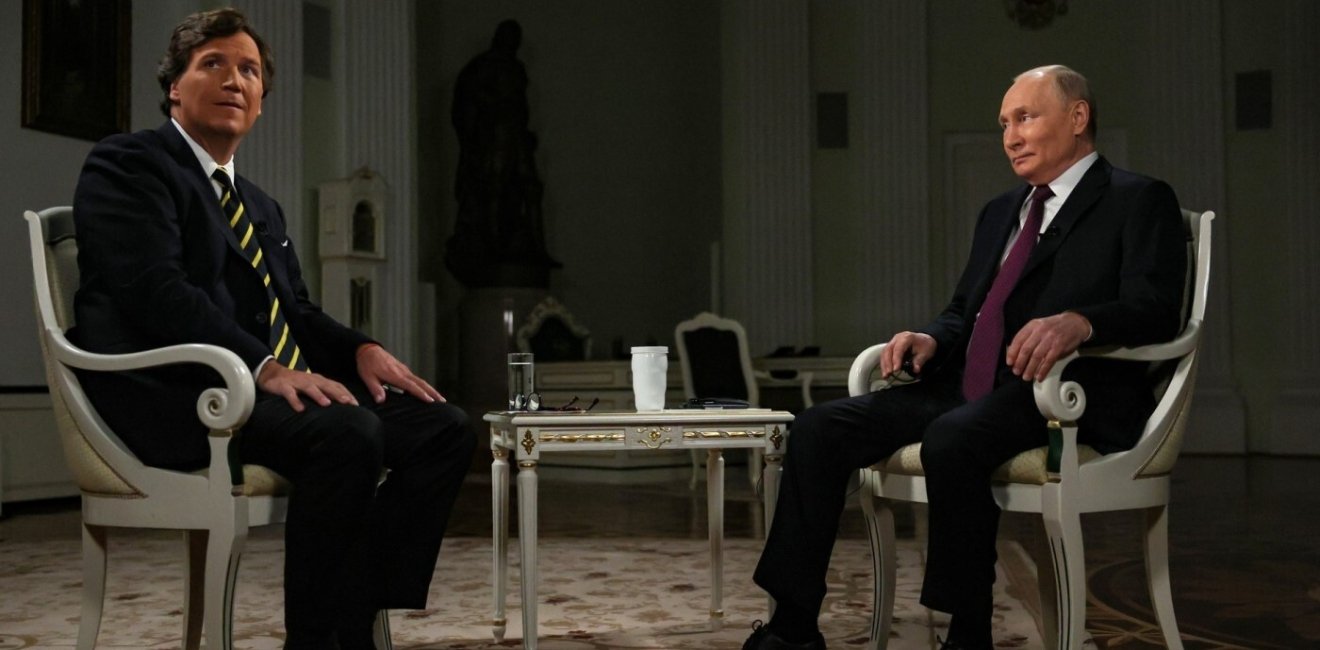
A blog of the Kennan Institute
This week Vladimir Putin was given a chance to address Western audiences from the comfort of his Kremlin office. The American TV presenter Tucker Carlson recorded an interview with Russia’s president and circulated it through his social media. Russia's state-run media made a spectacle out of Carlson's visit to Moscow, reminiscent of the events staged by Soviet propaganda during the visits of Western figures in the Stalin or Khrushchev eras.
The Gist of the Putin Interview
The conversation could be broken down into three major blocks. In answering Carlson’s question about any immediate threats that might have provoked his invasion of Ukraine, Putin launched into a twenty-minute lecture about his version of Russia’s and Ukraine’s history. There is of course a wealth of literature, both academic and popular, offering different perspectives on the histories of the two countries. Carlson did not reference any of these alternatives and simply recorded Putin's well-rehearsed monologue.
In the second large chunk of the conversation Putin delved into his other favorite subject, the treachery of the West. He repeated his version of the “not one inch” story, in which the West promises not to expand NATO into the formerly Soviet-controlled countries and then expands it anyway. This myth has been debunked many times, including in an academic study based on declassified records of the conversations in question. Carlson did not challenge Putin’s presentation.
The third part of the interview mainly revolved around Putin’s account of Russia’s war against Ukraine, which, in his telling, is not Russia’s war at all. Putin reiterated that Russia is trying to stop the war launched against it by a Western-controlled Ukraine. The interviewer did not raise any obvious objections to this narrative.
Overall, Putin was given ample opportunity to lay out his talking points without opposition. He presented himself as a peacemaker opposed by warmongers of the West. He referred to Ukraine’s 2014 Revolution of Dignity as a “coup d'état” and claimed that Ukraine was effectively ruled by “Nazis” and in need of “denazification.” He even mentioned the “golden billion” conspiracy theory, suggesting a global elite ruling the world with the aim of solidifying their power, accumulating wealth, and marginalizing or eliminating others.
Russia’s Official Coverage of the Carlson Visit
Carlson’s itinerary was covered widely in the Russian press, from his arrival at the airport to his attendance at the Bolshoi Theater’s Spartacus to eating breakfast. Video footage of his movements was published everywhere, including the feeds of the state agency TASS.
Russia’s main state-run television channel, Channel One, has announced a special documentary series titled “Tucker’s Three Days.”
The vast majority of Russians knew absolutely nothing about Carlson just a few days ago. A TV star, and an idol of American right-wing populists, he wields influence over both his audience and politicians—in the United States. That is why Putin is interested in him.
Carlson’s interview with Putin was dubbed a historic event well before it was aired. The state agency RIA Novosti expressed the hope that this time, a dialogue with a Western journalist would not slide into accusations against Russia.
This treatment would be familiar to those students of Soviet history who know about the overhyped visits to Moscow by friendly dignitaries, including the writers Lion Feuchtwanger, Romain Rolland, or Jean-Paul Sartre. Carlson’s way of covering Putin is also reminiscent of the work of New York Times journalist Walter Duranty, who in the early 1930s interviewed Stalin, did not notice the famines of the time, and defended the Soviet system’s necessity.
Carlson’s History of Russia Coverage
The Kremlin’s embrace of Carlson is understandable. On February 22, 2022, two days before the full-scale invasion, Carlson declared the conflict a “border issue” and described Ukraine as “a client of the U.S. State Department, a puppet of Washington.” At the beginning of the big war, Carlson laid off making such remarks somewhat, but he soon resumed them. In March, Mother Jones reported that the Russian Presidential Administration, in its new manual for the media, strongly recommended quoting Tucker Carlson as often as possible.
In December 2022, Carlson got to work trying to destroy Volodymyr Zelensky. “Dictator” and “dangerous authoritarian ruler” were only some of the epithets he used on-screen. He became the most prominent critic of American support for Ukraine.
Trump and Carlson together raised a wave of doubt about the financing of Ukraine, this distant Eastern European country that is part of Putin’s sphere of influence. So let Putin figure out the problem! What do American taxpayers have to do with it? Step by step, Carlson has been busy moving a simple idea into mainstream perception: Ukraine is not America’s problem. Let the EU be responsible for it.
Tucker’s main thesis in recent months: Zelensky is dragging America into war. The TV personality’s goal is to humiliate not only the Ukrainian leader but also the current American one.
Mission Accomplished, Now Back to Facts
As Donald Trump barrels toward the Republican nomination and victory in the national election in November, it makes sense for the Kremlin to try to influence Americans through Tucker’s broadcasts and tweets to make them even more critical of Ukraine. It makes sense for the Kremlin to push its false message that it is merely engaged in “demilitarization and denazification” in Ukraine, a message that has been successfully instilled in millions of Russian minds.
Putin is not alone among political leaders who exploit historical injustices to fuel their revanchist agendas. This political strategy is not exclusive to the Russian president; it is also employed by leaders in countries such as Cuba, China, Hungary, Iran, Serbia, Turkey, and Venezuela. They consistently lament past humiliations, the absence of international recognition, external hostility, and perceived unjust border demarcations.
All in all, Carlson’s mission should probably be qualified as a success for the purposes—political rather than journalistic—he may have had in mind before starting on this project. One can only hope that this sort of approach will not distract Western audiences from fact-based studies and expert-supported perspectives on Russia’s current leadership.
The opinions expressed in this article are those solely of the author and do not reflect the views of the Kennan Institute.
Authors


Editor-at-Large, Meduza

Kennan Institute
After more than 50 years as a vital part of the Wilson Center legacy, the Kennan Institute has become an independent think tank. You can find the current website for the Kennan Institute at kennaninstitute.org. Please look for future announcements about partnership activities between the Wilson Center and the Kennan Institute at Wilson Center Press Room. The Wilson Center is proud of its historic connection to the Kennan Institute and looks forward to supporting its activities as an independent center of knowledge. The Kennan Institute is committed to improving American understanding of Russia, Ukraine, Central Asia, the South Caucasus, and the surrounding region through research and exchange. Read more

Explore More in The Russia File
Browse The Russia File
Chechnya as a Model of Modern Russia

Russia’s Indigenous Communities and the War in Ukraine

Gas and Power in a Changing US–Russia Relationship

